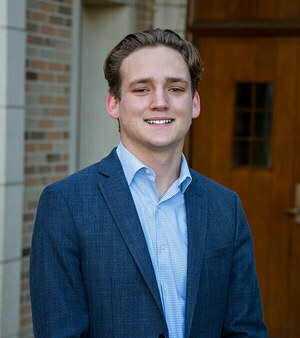LEO was a natural fit for undergraduate intern and recent Notre Dame grad, Greg Miller. During his sophomore year, Greg became involved in housing policy and advocacy with the Economic Justice Clinic at Notre Dame Law School. That’s how he met a new LEO faculty member, Professor Rob Collinson, who happened to be in need of a research assistant. Greg has been working directly with Rob on housing-related LEO projects ever since. They’ve been able to explore everything from eviction costs to the effects of affordable housing tax credits.

Serving the right way
“I’m deeply interested in how to give equal opportunity within our country, and I think we’re far from that. I also think that traditional welfare programs have been ineffective in achieving their ends,” explained Greg. Greg worked extensively to advocate for tenant rights in the South Bend community with a nonprofit he co-founded called the South Bend Tenant Association, and saw firsthand people waiting decades to get a housing voucher. So, through LEO, he did projects related to how to best design housing voucher waiting lists.
“I’ve interacted with tenants who are in this cycle of paying rent every month, but struggling to pay rent. They have little means left to pay for food or anything else. Then I see them get evicted and that’s the end for them. And that’s the end for their family as well.”
Breaking the cycle
LEO is dedicated to breaking that cycle. “Recently, I was interacting with a tenant who has two children and for three months was facing homelessness,” said Greg, “And we finally got her stably housed, but we saw the ways in which she was fearful of her children becoming homeless. Those children don’t have equal opportunity, and I want to create equal opportunity. But I also see the ways in which we can’t just allocate resources to poverty randomly and arbitrarily. We have to do it in a set way that is going to actually be the most helpful.” Economics is a primary way to answer these questions.
For many families, the repercussions of falling into poverty continue for years to come. It’s not just those immediately facing homelessness affected, but also their children. LEO’s mission is all about disrupting that generational cycle.
Greg himself is a testament to people’s ability to overcome these cycles. “I come from an extremely low-income background. We didn’t have a car, internet, a dryer. It definitely made me aware of the inequalities that exist and the ways in which growing up low-income makes it much more difficult to make it to a top tier university like the University of Notre Dame. Or to even make it to some sort of stable life. But, more importantly, I saw the ways in which that cycle of just trying to pay rent every week was a form of anxiety. I grew up in a mobile home, which is partially what inspired my thesis.”
Focusing in
While he has worked on a wide variety of projects with Rob, for the past few months Greg has been working on his senior year thesis on rent stabilization in mobile home communities.
“Basically, what happens is people own their mobile home, and not the land underneath. But they’re not actually mobile, so now we’re starting to see a huge increase in institutional investors buying mobile home parks and increasing the price. Since the homes are not mobile and often cost around $10,000 to move, the low-income tenants who own these homes are stuck with the impossible decision of either stomaching unreasonable rent hikes or abandoning their biggest asset, their home.
With the help of LEO’s access to data, Greg has been able to analyze California jurisdictions that implemented rent stabilization mobile home communities. These programs currently have little economic research. “We know a lot about rent control, but mobile homes operate very differently than apartment complexes where landlords own both the land and the building.”
For Greg, LEO’s experiment-style research is the best way to test different theories about what actually helps people, what doesn’t, and what has the potential to help people the most: “It’s all about allocating our resources effectively to combat poverty, and that includes the mission that LEO is trying to fulfill.”
Greg’s work with breaking the cycle of housing instability will continue after graduation. He will be working for the Office of Policy Development and Research at the Department of Housing and Urban Development—a decision impacted by his research on housing policy at LEO.